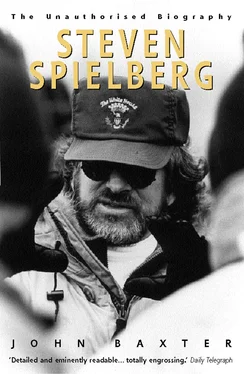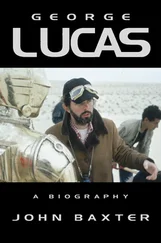To memorialise this incident, Spielberg has incorporated a shooting star in all his films.
The other event of 1952 was his first experience of a movie theatre. Again it was Arnold who took him, after carefully explaining what they were going to see. Not carefully enough, however, since Steven thought Cecil B. DeMille’s film about a circus, The Greatest Show on Earth , was a real circus and not one on film. The circus interested him, since his mother had told him how an uncle had run away with one as a boy; the same uncle, it seems, who had been in the black market, and had hidden contraband watches under the family bed.
DeMille’s film conflated all the fantasies of circus life: the clown, played by James Stewart, whose permanent make-up hides his tragic past as a surgeon; sadistic animal trainer Lyle Bettger; French trapeze artist Cornel Wilde (‘Ze Great Sebastian’); tough boss Charlton Heston, and all-American love interest in the person of raucous blonde Betty Hutton, all culminating in the collision of two trains where Stewart’s long-suppressed skills are called upon.
Arnold told Steven, ‘It’s going to be bigger than you are, but that’s all right. The people in it are going to be up on the screen and they can’t get out at you.’ (This is a common fantasy of suggestible children. Stephen King shared it, and as an adult persuaded his children not to sit too close to the screen by telling them that people who did so fell into the picture and became the extras visible behind the stars.) Spielberg recalls:
So we stood in line for an hour and a half, and we go into this big cavernous hall and there’s nothing but chairs and they’re all facing up, they’re not bleachers, they’re chairs. I was thinking: something is up, something is fishy. So the curtain is open and I expect to see elephants and there’s nothing but a flat piece of white cardboard, a canvas… I retained three things from the experience: the train wreck, the lions and Jimmy Stewart as the clown.
As soon as he had a train set, Spielberg repeatedly recreated the crash, and shadows of DeMille’s cardboard characters drift through many of his films. Indiana Jones has something of Heston, while Betty Hutton is the model for Willie, the shrill nightclub singer heroine of Indiana Jones and the Temple of Doom . Above all, DeMille’s showmanship left an indelible impression. ‘I guess ever since then I’ve wanted to try to involve the audience as much as I can,’ said Spielberg, ‘so they no longer think they’re sitting in an audience.’
He continued to find movies, unlike television, emotionally overwhelming. Especially Disney cartoons. At eight, he said, he ‘came screaming home from Snow White …’ – in some interviews he’s eleven, and the film is Bambi – ‘and tried to hide under the covers. My parents didn’t understand it, because Walt Disney movies are not supposed to scare but to delight and enthral. Between Snow White , Fantasia and Bambi , I was a basket case of neurosis.’ Though he was allowed to watch the Wonderful World of Disney TV shows, with their compilations of cartoons and behind-the-scenes documentaries about Disney films in production, his parents tried to keep him away from the feature cartoons. It gave them a glamorous sense of the forbidden they never lost.
One price of Arnold’s job in a sunrise industry like electronics was the occasional moves in search of work or promotion. In 1950 the Spielbergs had relocated in Haddonfield, New Jersey, when he joined RCA. In 1953 he took a job with General Electric in Scottsdale, Arizona, then a dormitory town east of Phoenix, but now a suburb. They were to spend eleven years there. The move wrenched Steven, and instilled his lifelong sense of dislocation and loneliness. ‘Just as I’d become accustomed to a school and a teacher and a best friend,’ he complained, ‘the FOR SALE sign would dig into the front lawn and we’d be packing. And it would always be that inevitable goodbye scene, in the train station or at the carport, packing up the car to drive somewhere, or at the airport. Where all my friends would be there and we’d say goodbye to each other and I would leave. And the older I got the harder it got.’ Among the first phrases he learned to say was ‘looking forward to’. His grandparents would occasionally come from New Jersey to Ohio to visit, and he loved it when his mother said it was something to look forward to.
His mother had been no less anguished. ‘I was hysterical,’ she recalled. ‘I mean, in 1955 what nice Jewish girl moved to Arizona? I looked in an encyclopedia – it was published in 1920, but I didn’t notice at the time – and it said: “Arizona is a barren wasteland.” I went there kicking and screaming. I had to promise Steve a horse, because he didn’t want to go either. I never made good on that promise, and he still reminds me of it today.’ Phoenix, as Jodie Foster was famously to remark in Martin Scorsese’s Alice Doesn’t Live Here Any More , is ‘weird’. Scottsdale, described by one visitor as ‘suburbia on steroids’, itself mixed mass-produced bungalows of the kind in which the Spielbergs lived with sprawling ranch-type houses set in gardens of sand, rock, spiky yucca and twenty-foot-high saguro cactuses. The desert around Scottsdale attracted more than its fair share of visionaries who exploited its open spaces and frontier manners to experiment. Frank Lloyd Wright started building his winter home Taliesin West just north-east of the town in 1937. Despite the discomfort of the fieldstone building, it became a centre for his students from Wisconsin, and after his death in 1959 metamorphosed into an arts centre and museum. One of Wright’s students, Paolo Soleri, chose another spot outside Scottsdale to build Arcosanti, his ‘arcology’, a community of futuristic shell-like buildings integrated into the desert environment.
Spielberg seems never to have visited either Taliesin West or Arcosanti. The visions offered him nothing. He enrolled in Scottsdale’s Arcadia High School but, whatever school meant to him, it wasn’t higher education. He’s always avoided discussing classes or his academic record, which, in common with most of the Movie Brats, was dismal. A survey of America’s twelve most influential media personalities in the nineties found that more than half never finished college. Three of them, including Ted Turner, were dyslexic. Spielberg has always had to struggle with the written word. There are no extant Spielberg letters, no diaries, and he never brings a script on set, preferring to memorise the shots beforehand. ‘He wasn’t a good student,’ Leah says. ‘He was less than mediocre. He needed tutors in French and math.’ Asked to dissect a frog in biology class, he threw up, an incident recycled in E.T. His sole reference to English class is a memory of turning a copy of Nathaniel Hawthorne’s The Scarlet Letter into a flip book by drawing cartoon characters on the corner of each page.
More important than anything that happened in class were the friendships and alliances of the playground. Like any sensitive child Spielberg loathed new places and people but, once accepted, he embraced them with jealous fervour. The metaphor of the new school remained with him for life. When he encountered George Lucas’s tight team, he found it like changing schools. He felt, he said, as if he’d moved into Lucas’s eighth-grade class.
At Arcadia High School he signed up with the Boy Scouts, and was admitted to its honour society, the Order of the Arrow. He began to study the clarinet too, and to march in the school band. Leah’s preoccupation with her piano prejudiced him against the classical repertoire, and he would never warm to pop or rock. His ideal was movie music, of which he soon had an encyclopaedic recall. Once he began making his own amateur films, he would noodle tunes on his clarinet, but only for Leah to transcribe for piano and record as soundtracks.
Читать дальше












